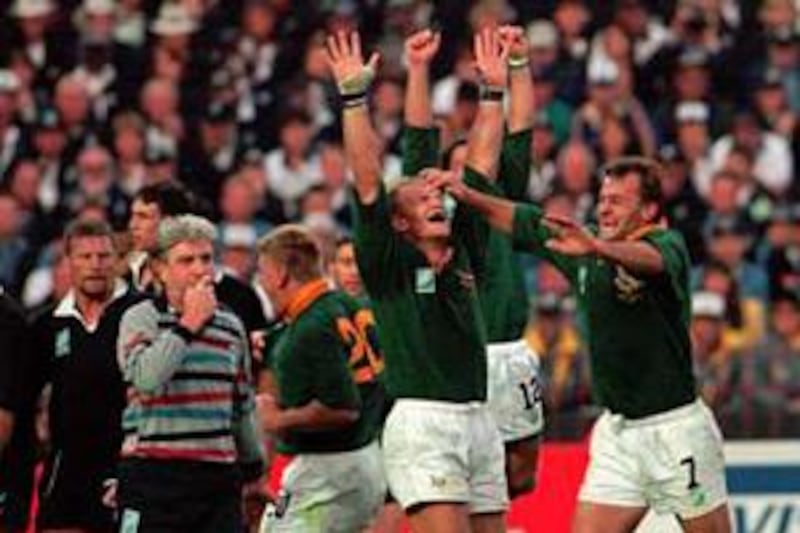Two years ago the iconic Springbok captain Francois Pienaar was asked about the frenzied aftermath of South Africa's victory in the 1995 Rugby World Cup final. "No Hollywood scriptwriter could have done better," he remarked. At least one has tried, the result of which will be there to see later this year with the release of The Human Factor, directed by Clint Eastwood and featuring Matt Damon as Pienaar and Morgan Freeman as Nelson Mandela.
It is little wonder the triumph beckons for the silver screen. The moment blended drama, history, nation-building, hope and magnanimity in a way that was unprecedented in sport. Bound together by the slogan "One Team One Country", the Springboks, who pre-1994 were generally despised by the black majority, marched to the final on home soil. The opponents that day were their great rivals, the All Blacks, with fierce totem Jonah Lomu among their ranks.
Along the way the Sowetan newspaper christened them Amabokoboko, a term of endearment in native black language. The country was swept up as one like never before. Unlike previous years, when the national rugby team were the almost exclusive preserve of whites, the 1995 Boks went out of their way to be inclusive. They even adopted Shosholoza, an old black miners' hymn, as their team song and invited all South Africans along for the ride.
Archbishop Desmond Tutu declared his support, but the biggest endorsement came from an unlikely source: Mandela himself. When he stepped on to Ellis Park before the final wearing the Springbok No 6 jersey and a Bok cap, the stadium erupted. The spontaneous chant of "Nelson! Nelson!" rang out from the predominantly white crowd. It was a special moment and it instantly bestowed on rugby in the country the status it had so long craved: a game intended for all, black and white.
Picture the scene and now try to imagine any other world leader doing the same. Only Mandela, blessed with great humanity and the extraordinary ability to draw people together, could have read the setting so perfectly and pulled it off with such sincerity. "It was a moment of magic, a moment of wonder," said team manager Morne du Plessis. "It was the moment I realised that there really was a chance this country could work. The man was showing that he could forgive, totally, and now they - white South Africa - showed in that response to him that they too wanted to give back."
What followed was a final of brutal intensity, compounded by the agony of extra-time. The Springboks went on to win 15-12, with Joel Stransky's majestic dropped goal finally deciding the outcome. The All Black captain Sean Fitzpatrick remarked how he felt when he saw the crowd's reaction to Mandela before the kick-off. His heart sunk because he knew how much it would lift the home nation and how much it would mean to the once-fractured country.
Indeed, as a demonstration of Mandela's stated desire to unite the most divided nation on earth around a common goal, the World Cup was an enormous success. Television images beamed across the world of black and white people embracing in the streets, celebrating together and confirming Mandela's notion that "the Boks belonged to all of us now". Given the dreadful realities of apartheid and the awkward shift to democracy, the triumph was a salve for all South Africans.
It was also a brilliant example of statesmanship from Mandela. He had walked into a traditionally white crucible and declared his support for the "white man's game". Almost from that moment South Africa's right-wing whites were pushed to the margins. If Mandela could be this magnanimous, went the reasoning, who were the rest of us to shun nation-building? Of course this coming-together could not last. It is to rugby's eternal shame that the moment was not seized to truly make the sport a game for all. That fervour and excitement from the black community was not harnessed and rugby lapsed into its old habits.
It is true that many black players have since emerged to represent South Africa, among them the splendid Bryan Habana, but transformation remains the game's biggest challenge. Matters were not helped when SA rugby president Louis Luyt dragged Mandela off to court in 1998; an unseemly episode of pure betrayal on rugby's part. For most, the memories of 1995 are of a golden, glorious time in South Africa's past. But that is all they are - just memories.
cvanderberg@thenational.ae





